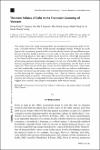Item Infomation

| Title: |
| “The new politics of debt in the transition economy of Vietnam” Austrian Journal of South-East Asian Studies 12(1), (2019) 91-110. |
| Authors: |
| Nguyen HKT |
| Co-Author: |
| Nguyen VHT Vuong TT Ho MT Vuong QH |
| Abstract: |
| This study reviews the rising household debt and nonfinancial corporation debt in Vietnam, a socialist-oriented, lower middle-income emerging economy. Vietnam has made huge strides in economic growth within three decades of reforms, lifting millions of people out of poverty thanks to better access to credit. At the same time, there are lending and borrowing practices that signal troubles ahead. Based on a thorough examination of the theoretical literature on indebtedness, the study sets out to identify the drivers of borrowing and over-borrowing in Vietnam in recent years. Particularly, the abundant financial and physical resources have given rise to onsumerism and the boom of the super-rich. These are two of the four factors that have shifted Vietnamese culture from one that traditionally condemned debt as a vice to one that now tolerates indebtedness. The other two factors can be found at the corporate level where there is an over-reliance on debt financing and rampant rent-seeking. Here, a kind of ‘resource curse’ threatens sustainable corporate growth – businesses rely too much on borrowing to fuel their operations, but in fact are overlooking the innovation factor. The new politics of debt, we suggest, have created a toxically pro-consumption, debt-tolerant society. |
| URI: |
| https://dlib.phenikaa-uni.edu.vn/handle/PNK/200 |
| Appears in Collections |
| Bài báo khoa học |
ABSTRACTS VIEWS
205
FULLTEXT VIEWS
14
Files in This Item:
